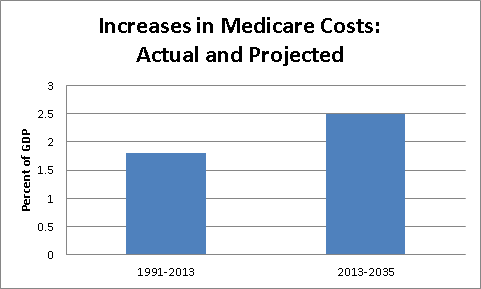March 21, 2013
From reading the newspapers and blogs you would think everything must be great in the country. Hey, no problems of mass unemployment, poverty, folks losing their homes, etc. How else can we explain the obsession with an aging population?
Yes, the population is aging, just as it has been aging over the last century. Yeah, we’re living longer. You got any bad news for me?
Today we have Kevin Drum and Ezra Klein giving us the bad news. It seems Medicare’s costs are projected to increase by 2.5 percentage points of GDP over the next 22 years and most of this (1.7 percentage points) is due to aging, not excess health care cost growth. Should we be worried?
Let’s look at a somewhat different graph than the one they highlight.

Source: Congressional Budget Office.
What this graph tells us is that Medicare’s costs, measured as a share of GDP, increased as much in the last 22 years as they are projected to increase due to aging in the next 22 years. The rest of the increase (0.8 percentage points) is due to projected excess health care cost growth. In other words, the impact of aging alone is no more of a problem going forward than the increase in Medicare costs was for us in the last 22 years. The reason that the total cost growth is projected to be greater is entirely due to the projections of excess health care cost growth.
There are a couple of other points to be made. We would cut our health care costs roughly in half if we paid as much for our health care as any other wealthy country. This would seem to argue for increased trade in health care services. Currently the Obama administration is negotiating major trade agreements with both the European Union and with Asian countries in the Trans Pacific Partnership. How much do you want to bet that more trade in health care services is not on the list of items being addressed? When it comes to doctors and other health care providers our Washington elite types are as hard core Neanderthal protectionist as they come.
The other point is that if workers got their share of projected productivity growth over this period, wages would be around 40 percent higher in 2035 than they are today. How much do you want to bet that workers would prefer before-tax wages that are 40 percent higher with another 2 percentage points pulled out for Medicare, than stagnant wages and no tax increases?
In other words, why are serious people wasting time over this nonsense? There is much more at stake in controlling health care costs and ensuring that workers get their share of productivity growth than there is with aging.







Comments